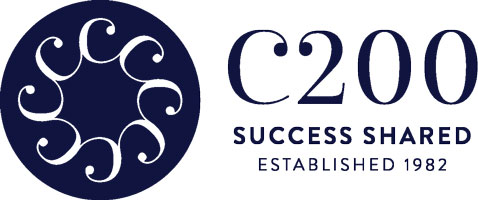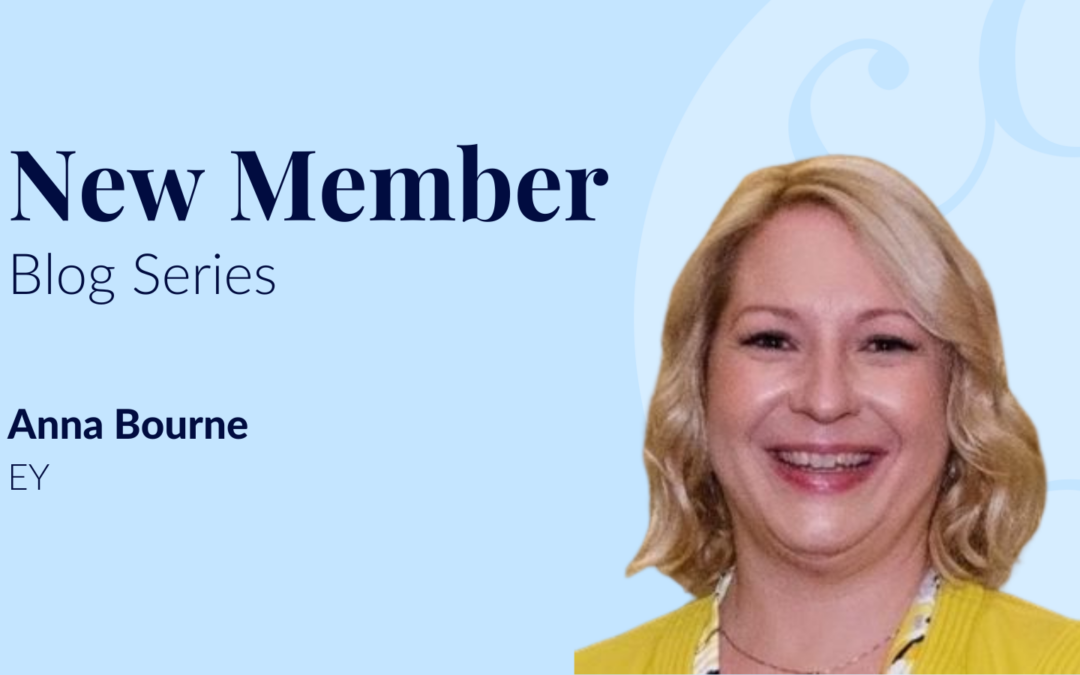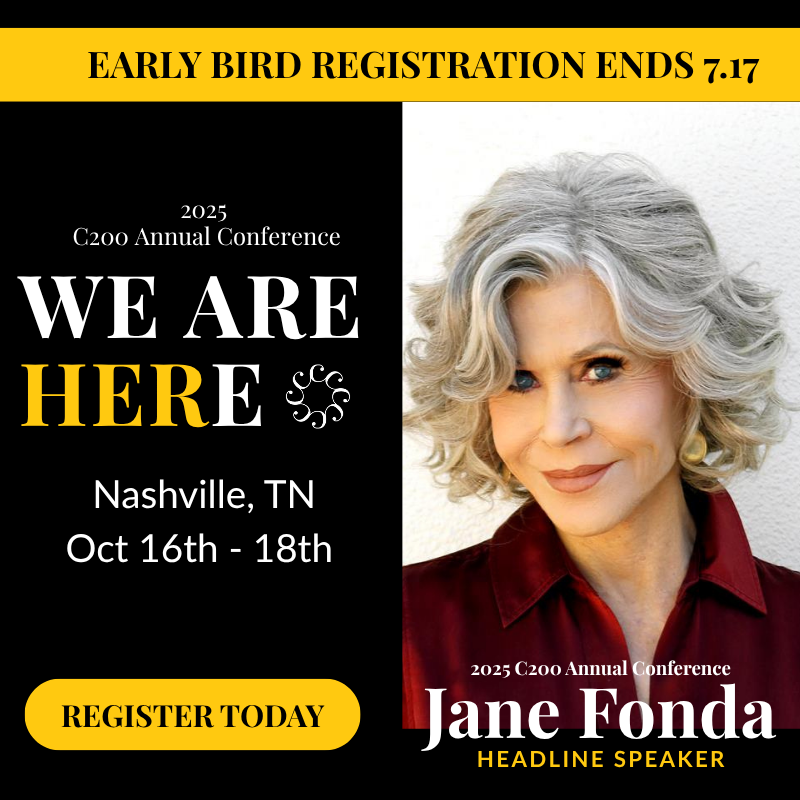Anna Bourne is a Global Client Service Partner at EY, whose responsibilities include leading global accounts and executing business transformations for multi-national Fortune 250 clients. Anna is a strong advocate for DEI and believes that women hold the key to continuing a supportive and inclusive workplace culture. Outside of work, Anna enjoys a good hike, spending time with her four kids, and a competitive round of bridge. Anna has been a C200 member since January 2024.
Eva Glassman: What does it mean to be a Global Client Service Partner at EY?
Anna Bourne: I am basically the CEO of all the services that EY provides to my global clients and responsible for the scoping, contracting, delivery, and quality of the work.
I also have a second role, which is market leadership on the east coast for EY’s Advanced Manufacturing and Mobility sector. We do the revenue planning and accounting enablement discussions of the accounts in the east that fall under that sector to make sure that those accounts are being properly served. We break them up into groups in terms of size and scale and figure out what we can do when we create a bespoke solution for a client and how we can leverage that through the sector.
EG: What do you spend the most time doing on the day-to-day?
AB: You never know what the day is going to be like because, in addition to my two roles, I have the pleasure of serving on our Global DEI Steering Committee. While there are certain regular cadences like earnings calls, different things take precedent depending on the day. For example, deals can start as a whisper and then turn into a freight train very quickly. Some of the timelines are very aggressive and you never know what will boil up to the top.
While I can’t say my week is 20% of this role, 40% of this role, and so on, I have amazing teams across all my roles that can help juggle things to the finish line. The skill sets to bring out in certain people on certain teams are all different, but that’s the secret to why we’re high-performing.
EG: I’m curious about your career journey. Where did you start, and how did you end up here? Why do you think it all worked out?
AB: I went to school at University of Wisconsin – Madison, and my parents had always told me not to rely on anybody else, to make sure I could find my own way in the world, so it was important for me to pick a profession that I’d be able to support myself with. Back in the day, that was accounting, so that’s the path I followed. I was okay at it, but I didn’t particularly like it.
After I graduated, I started out in a “Big Eight” company in external audit, and while I learned a lot in that first role, I always felt like I was looking in the rearview mirror. I wanted to do something that was forward-looking or contributing to the success of something, versus, as my father would say, “bayoneting the wounded after the battle.”
So, I took a role with a client and left public accounting for two years. I was the assistant controller and officer at Federal Signal Corporation and learned a lot from the role. It was eye-opening to see accounting from the client side and to realize the impact I could have doing things like process improvement work or strategic transformations—things that would actually make the business and environment better.
Eventually, however, I became uninspired by my work and wanted more of a challenge. That’s when I decided to return to the firm and focused primarily on automotive clients like Caterpillar, Navistar, and Tenneco. At the time, they were creating a different service line for the consulting side, so I was returning to something nascent and had the chance to get in on the ground level. I really enjoyed that, because there was so much opportunity to create improvements and forward-looking things.
The firm saw how I was excelling at my job and asked me to relocate to Atlanta and run a practice. Before this, I had only been responsible for client services; now, being on both the OPS and talent side was an eye-opening experience. It was much harder than I anticipated, but after three years, the firm said something to the effect of, “Why don’t you move up and run a practice three times as large in New York?” By then, I knew I could do it; I was in that role for several years.
Eventually, the firm informed me that someone on the Executive Board was stepping down due to health issues and needed someone to fill his role, which was not on my radar at all. However, I felt glad to work for a firm that was concerned enough about someone’s health to immediately say, “You need to focus on your health,” and get someone else to fill in—so I said yes. I am lucky that my deputy was able to take over my role so I could move to this one. I came into it mid-year with no talent training, but I learned a ton.
After a few years, I was interested in being on what we call G360s, so I took on one of the top accounts in the firm, and I think that is the best job I’ve had. Eventually, the firm gave me the current job I have, so that’s how I ended up with two roles.
EG: What do you think was the biggest factor that led to your success and continuing to advance and move up?
AG: It’s always about being willing to try something new. People who are willing to get out of their comfort zone, have a growth mindset, and move onto something else recognize that all the things you’ve learned and experienced to that date will apply to something.
Even my experience raising four kids helped me learn and grow in my career—not because there’s child-rearing in my day job, but because some of the things you experience in your personal life can apply professionally. Do you want to be “right,” or do you want to achieve your goals? Do you want to stay married, or do you want to be “right”? For me, it’s always the second option.
You can’t worry about being right. You have to trust that you have the talent and skills, and that a learning curve is nothing to be worried about because we face them all the time. Lots of people stay in one spot for too long, get stuck in a rut, and become miserable; I’m a huge fan of term limits on certain leadership roles.
When I was on the Executive Committee and went back to client services, people asked me, “Did you job fail? Why would you leave an executive role to be in client services?” I’m a creative person—shouldn’t I get to be creative? The way people love to have their names and titles in boxes is a fascinating psychological study to me. It’s a lot more important to talk about what you’re learning from and giving to a particular role.
Often times, people see something in you that you don’t see in yourself, and so it’s important to have people around you who aren’t going to just pat your head and tell you, “You’re doing great!” Those people should be saying, “Let’s challenge that—you seem to have mastered that. How about adding something else?”
It’s easy to dig your heels in and think, “Why can’t everybody see it my way?” It’s much more fruitful to approach a situation thinking, “Let me hear your perspective and why or what led you to that conclusion.” I think it’s hard for people to do that, and there’s still a lot of people who are very self-interested. Self-interested leaders don’t create followership, and if you lack followership, you’re headed for a bad ending in that role.
EG: How did you get involved with C200? What drew you to the organization?
AB: I actually didn’t know much about C200 before joining. I was at an unrelated event last November, and one of the women I went with, Susan Skerritt, who is a retired partner at the firm, was going to a C200 meeting. I asked, “What is that?” I find out that Cindy Doe, Deidre Quinn, and all these other women I know and respect a lot are in it, too; I had no idea! I told myself I would check it out, and that’s how it happened.
I think a lot of women get asked to be on a bunch of women’s organizations, and it’s hard to see through the vastness of the market. C200 is different; it has a much better balance of what you contribute and what you get out of it than a lot of other organizations.
EG: Because C200 is all about women paying it forward, I want to know about your experience as a woman rising in her career. Did you have any women mentors?
AB: There were very few women in leadership when I started at the firm. Apparently, a few years before I started, we didn’t even have a maternity policy. Even today, we hire over 50% women and still don’t see that reflected in our leadership.
My mentors were primarily male until I was a senior partner and had the benefit of meeting a very talented woman who had been a Canadian partner and just came to New York. That opened the door to getting in touch with more women who were at the senior ranks; that mentorship was helpful, but it was much later in my career.
Early on in my career, the women who were advanced had a mentality of, “I found my way here, but I’m not going to help you.” As Madeline Albright said, “There’s a special place in hell for women who don’t help other women!” When I decided to have a baby, people said to me, “You should probably quit the firm because you clearly can’t do both,” to which I said, “Why not?” I do feel as though there were structures, both cultural and corporate, setting women back quite a lot by fellow women who felt that you should pay your dues. There’s a lot more willingness now for women to help each other and not feel like that’s taking something away from them. I’m glad to see that change, and we need to do everything we can to ensure that continues.
EG: Related to that, what does being a “woman in business” mean to you, and how do you apply that thinking to your personal and professional life?
AB: Although this is a generalization, I think women embrace the idea of empathy more and know how to appeal to the hearts and minds of others; a lot of inspirational leaders try to do one and not the other. Women understand the totality of people, and that helps create more inclusive spaces. Women in business are getting better at integrating in a way that’s genuine to them and authentic to who they are, and that’s doing a world of good in terms of creating more people who want to follow that model.
When I first started out, I would never tell anyone when I needed to take my kid to the doctor; meanwhile, my colleagues were taking four hours to the golf course. Those kinds of things are hopefully becoming things of the past, and now we’re prioritizing people being allowed to bring their whole selves to work. Female leadership does a solid job of that and doing it for the right reasons turns out to have a very big impact on business.
EG: A woman’s experience growing up in the world, both what they perceive and how they are perceived alike, really informs how they lead, and it often times shows in how they include others in the workforce.
AB: In my Global DEI Steering Committee role, we’ve spent some time learning that there’s a consistent issue in assumed universality, which creates implicit bias. To use affluence as an example, people growing up in certain wealthy areas assume everyone has the same experiences. For example, I often hear people say, “Oh, you don’t ski?” It leads me to wonder how we can create common ground without making someone feel stupid or “less than” for, say, not skiing.
Women are better at asking questions that don’t put themselves at the center. If someone says they don’t ski, you can ask about what they enjoy doing and go from there. There’s a way to pivot the conversation without sounding pejorative and making the person you’re speaking with feel othered. It’s so interesting to me how that idea of having “have-nots” creates a confirmation bias.
EG: How do you like to spend your time outside of work?
AB: I love to hike and get outside. My husband is a great chef and has a wine cellar, so I eat and drink well. I’ve got a German Shepherd and he’s the smartest dog I’ve ever had.
My youngest child is studying abroad, so I’m excited that all of them are out and living their lives. Besides spending time with my kids, I enjoy bridge. I know it’s a game that, according to my colleagues, is popular with a demographic much older than mine, but all my kids play, and my daughter-in-law is learning. We like to do things that are slightly competitive.
EG: What is your advice to aspiring female business leaders to advance their careers? If you could go back and tell your younger self one thing, what would it be?
AB: Networking is a really strong thing. Getting a “Board of Directors” or outside perspective to help when you’re struggling with something that you can’t go to your team with is also important. Get different perspectives and other ways to look at things. Ask for contrarian points of view and make sure you’re doing what you do for yourself first and foremost.
Women will run to the eleventh hour when it’s not the best thing for them or their health, and they don’t realize it because they like to be needed. Make sure you set some boundaries and live by them so that you can be in a good place for others.
EG: Finding boundaries can be difficult, because, especially for women in the workplace, you want to be able to stand alongside your team, have a good reputation, and have people respect you. There’s an element of having to “prove yourself” as a woman in most spaces that makes it very easy to let your boundaries break down.
AG: “No” is a complete sentence, people! There’s a problem with the boundary side for a lot of our female executives, and I think that’s something I’d do differently in my own career if I had to do it again. But having said that, I still would rather air on the side of doing too much than too little. What isn’t being done, and how can you contribute to that? Figure out what it is that you can have an impact on.
There’s a great Harvard Business piece about the “monkey on your back” and how there are some people who go around putting their monkeys on everyone else’s back. If you’re going to be what my parents called the “patsy,” you’re not going to further your career; you’re really just doing someone else’s work, and that’s a bad place to be.
EG: What are you most excited about as a new C200 member?
AB: Given that I hadn’t heard anything about C200 before joining, I joined because I was so excited to be a part of a community that so many women I know and respect are a part of. I’m going to the FunRaiser in June at Ginger Bailey’s Canoe Island Lodge. I’ve heard great things about FunRaisers, so I’m jumping in with both feet! I’m really looking forward to getting immersed in the organization, meeting a lot of members, and gaining a whole new network and support system.


